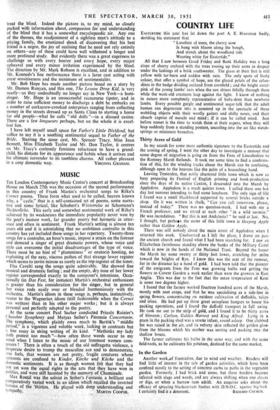Thirty Acres of Gold
In my search for some more authentic signature to the Eastertide and the coming of spring, I went the other day to investigate a rumour that some degree of migration is going on from the Fens of Lincolnshire to the Romney Marsh flatlands. It took me some time to find a confirma- tion of this, for the winding tracks about the Marsh can be confusing, although open to the heavens like the palm of a beseeching hand.
Leaving Tenterden, that nobly chartered little town which is now so busy preparing its Festival of English printing and book-production since the days of its native Caxton, I descended into the Marsh by Appledore. Appledore is a much quieter town. I called there one hot day last summer intending to find some luncheon. The only sign of lift I found was a small blackboard supported by several bricks outside a shop. On it was written in chalk, "Can you call tomorrow, please, instead of today." There was no question-mark. 1 had with me a French professor, and we stared at each other "in a wild surmise." He was incredulous. " But this is not Andalusia! " he said at last. No, I thought, but perhaps the name of this little town is Sleeping Apple rather than Golden Apple.
There was still nobody about the main street of Appledore when I returned this week. Unobserved as I left the place, I drove on pas: the ancient church and found what I had been searching for. I saw an Elizabethan farmhouse standing above the banks of the Military Canal which is now in the hands of the National Trust. Beyond the house the Marsh lay some twenty or thirty feet lower, stretching for miles toward the heights of Rye. I knew this was the scat of the rumour, for in the distance lay a band of gold. I had been told that the pioneer of the emigrants from the Fens was growing bulbs and getting the flowers to Covent Garden a week earlier than were the growers in East Anglia. This was due to the fact that the mean temperature of Kent is some two degrees higher.
I found that the farmer worked fourteen hundred acres of the Marsh, mostly with root crops, and that he was specialising as a side-line in spring flowers, concentrating on outdoor cultivation of daffodils, tulips and irises. He had put up three great aeroplane hangars to house his packing operations, and I found the daffodil transport in full swing. He took me out to the strip of gold, and I found it to be thirty acres of blossom ; Carlton. Golden Harvest and King Alfred. Lying in a pram in the packing shed was a serene infant, sound asleep. One clubbed fist was raised in the air, and its velvety skin reflected the golden glow from the blooms which his mother was sorting and packing into the shallow boxes.
The farmer cultivates his bulbs in the same way, and with the same field-tools, as he cultivates his potatoes, destined for the same market.






























 Previous page
Previous page